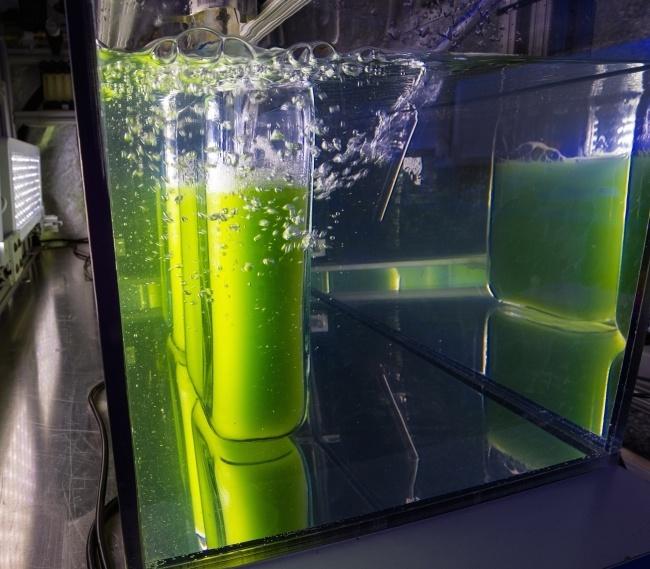
Fleet managers casting about for clean alternatives to petroleum may have more options in the near future. The Obama administration has been supporting algae biofuel research and development through the departments of Energy, Agriculture and Defense, and it looks like those efforts are beginning to pay off.
Although algae is still barely a blip on the alternative fuel screen, last week the Department of Energy offered a laundry list of reasons why algae biofuel could -- and should -- be ready to compete with fossil fuels and other biofuels, too.
In praise of algae biofuel
Algae represents a giant step forward in the field of biofuel, especially compared to food-based alternatives such as corn ethanol.
One of the main drawbacks of food-based biofuels is that they suck up agricultural resources that face increasing stress from the twin whammies of population growth and climate change.
In contrast, algae can be grown in environments where food cannot be grown. Man-made ponds, brackish water and wastewater are the examples cited by the DOE.
That advantage also provides algae biofuel with the potential to introduce new commercial activity into communities. Texas A&M University, for example, is deeply involved in algae biofuel research, and it recognizes economic as well as environmental benefits:
"With its high oil content algae is ideal for producing biodiesel and jet fuel, and it can be cultivated in brackish water on land unsuitable for growing food … Commercial microalgae farms in west Texas would generate jobs and enhance economic growth. Co-products from algae biofuels production show potential as a protein supplement in cattle feed or as a source of nitrogen fertilizer. This makes algae for fuel more economically sustainable."The Energy Department's algae biofuel article is a quick read, but for those of you who need things even quicker, here's the breakdown.
When the DOE talks algae, it's not talking about something that resembles seaweed or other water plants. It's talking about micro-scale organisms, aka "microscopic green machines," which harvest solar energy and store it in the form of oil.
The agency sees progress in the following areas:
- Engineering and/or finding natural strains of algae that can maximize oil production.
- Developing efficient methods for growing and harvesting algae, then dewatering and concentrating algae material for refining.
- Transitioning from demonstration-scale operations to commercial scale.
If you still don't have time to look over the DOE article, the department also offers a brief Energy 101 Algae-to-Fuel video (2.5 minutes) to catch you up on the latest news.
Algae biofuel companies not sitting on their hands...
The signs of progress are all well and good, but for the here and now algae biofuel companies have to find ways to hang on until they can achieve a profitable operation.
That means finding other ways to put algae to work, and on that score we've been following two algae companies that provide different examples of that approach.
One is the company OriginClear, which TriplePundit has covered under its former name, OriginOil. OriginClear's latest development, announced last month, is a pure algae concentrate that could reduce the use of conventional fertilizer.
The announcement was based on the results of field tests in Texas with OriginClear's partner company, AlgEternal, which is working with Texas A&M, among others, to provide third-party confirmation.
Another algae biofuel company familiar to TriplePundit readers is Solazyme. Working with global chemicals manufacturer BASF, last week Solazyme announced the development of the first commercial surfactant based on algae oil.
The new product, marketed by BASF under the name Dehyton AO 45, acts as a foaming agent in personal care and household products such as shampoos, among other uses.
The bottom line: While fleet managers are turning to compressed natural gas (CNG) for a cleaner-burning fuel in the short term, fossil gas as a source is highly problematic, and algae biofuel presents a more sustainable long-term solution.
Image credit (cropped): via U.S. Department of Energy.

Tina writes frequently for TriplePundit and other websites, with a focus on military, government and corporate sustainability, clean tech research and emerging energy technologies. She is a former Deputy Director of Public Affairs of the New York City Department of Environmental Protection, and author of books and articles on recycling and other conservation themes.














